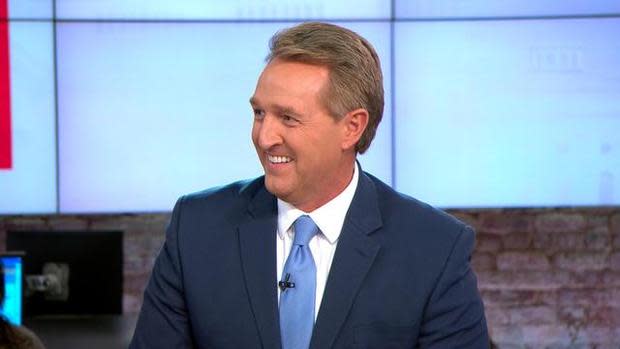Republicans are on trial with Trump, ex-GOP senator says
Former Republican Senator Jeff Flake of Arizona, who declined to seek reelection over his disagreements with President Donald Trump, said Monday that the Republicans' "cult of personality" around Mr. Trump will hurt the party even after the president leaves office.
He recently wrote in the Washington Post that, in the impeachment trial now commencing in the Senate, Republicans are on trial with the president.

Former Senator Jeff Flake (R-Ariz.). CBS News
"This president won't be there forever," Flake, a CBS News contributor, said on "CBS This Morning" on Monday. "He'll either be gone by this time next year or four years from now. Then what happens to the Republican Party? My fear is people out there know that, even if this is not an impeachable offense, that the president did something wrong, and for Republicans to maintain that he didn't is just wrong, and this has long-term ramifications for the party if we act as if we are just devoted to the president no matter what, and this cult of personality that we've seen, we certainly saw it in the House."
Flake stated, in a speech on the Senate floor in October 2017, that "politics can make us silent when we should speak and silence can equal complicity."
Co-host Gayle King asked, "Do you think, Senator, that you should have spoken up more? Do you regret that you didn't speak up more? And why is it so difficult for Republicans to speak up against this president when they don't believe what he's doing? Tell us why that's so hard."
"It's difficult because they want to keep their jobs," Flake replied, "and the president is extremely popular among Republican primary voters. That is a subset of a subset of a subset. They are those who decide who represents the party in the general election."
"Do you wish you have spoken up more, when you look back over it? I'm curious," asked King.
"You always look back and say, I could have done this different or that,' Flake said. "But I did speak up. I decided that, you know, I would have to condone behavior I couldn't condone or accept positions that I couldn't accept if I wanted to win re-election. That's why I didn't run."
Co-host Tony Dokoupil said, "People who voted for these Republicans in the Senate, when they say, 'Look, we support the president, we voted for you, we want you to support the president also,' isn't it fine and dandy from a voter perspective for them to toe the party line?"
Flake replied, "No, it's not. We have separation of powers, and Congress needs to stand up for its principles. Individual members do as well. It doesn't mean that they won't agree with the president. Often if you're Republican, you typically agree with a Republican president more often [than with a Democratic president]. But not all the time. Not to the extent particularly that the House Republicans did to say that the president did nothing wrong here."
Dokoupil said that, for the impeachment trial, "The Trump administration is saying they do not want witnesses; the Democrats do want witnesses and they are going to need four Republican votes to get them. Looks like they might have three. But from your conversations behind the scenes, from your knowledge of the way the Senate works and your former colleagues, will that fourth vote appear?"
"Certainly not with a motion that Chuck Schumer is likely to make tomorrow [to force a vote on witnesses]. He won't get any Republican votes for that. The time when witnesses may be called is after the president makes his case and the House impeachment managers do. So, down the road, then Susan Collins, Mitt Romney and also Lisa Murkowski have said that they are open to witnesses."
"They still need one more," said co-host Anthony Mason. "There are other moderate Republicans who are vulnerable in this fall's election. How difficult a decision is that to make?"
"That's a tough one for them," Flake said. "Certainly they don't want to draw the president's ire. Obviously they still have to win a primary which is coming up. But they have to win a general election after that. And to win a general election in a state like Arizona or Colorado or Maine is difficult unless you have said, 'Hey, we're going to hear this evidence and we're going to consider it,' like a senator should. And I think that they know that."
When asked his opinion on Senate Majority Leader Mitch McConnell's handling of the trial so far, Flake replied, "The fact that they will have a vote on witnesses after the president and the House presents their case, that speaks well for Mitch McConnell that they're doing like they did in the Clinton hearings.
"I wouldn't have said, as he did, that he would coordinate every move with the White House," Flake added. "That just says to people he's not going to be fair and impartial."
Michelle Carter's texts with Conrad Roy
